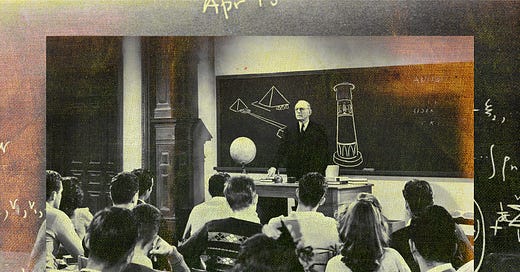
Every now and then, you run across a take so out there that you can’t believe there’s an actual human behind it. And as often as not, if you scroll down far enough you find out that the owner of this preposterous thought is a “professor.”
They are everywhere. A Yale women’s studies professor writes that gay white men are symbols of heterosexuality. A University of Massachusetts-Dartmouth professor specializing in black feminist “ghosts” opposes prison tours because it makes inmates feel “embarrassed.” A Rutgers professor offers her opinion on white people by declaring “we gotta take these motherf—ers out.” A professor at Old Dominion University writes a defense of adults who are sexually attracted to children.
And that’s just the past couple of months.
The beauty of the American higher education system is also its greatest weakness: While campuses are meant to be places where individuals are allowed to innovate by thinking outside of the box, too often those ideas are so far outside the box that they can’t see the box with the Hubble Telescope. And the high-minded ideals of “academic freedom” provide a carapace for such inanity—protecting crazy ideas and allowing them to foment within popular culture.
The Academics Gone Wild phenomenon provided the backdrop for a recent speech by Ohio Senate candidate and famous Yale Law School alum J.D. Vance, in which he declared we must “honestly and aggressively attack the universities in this country.” (At one point, he mentioned his degree from Yale, and an audience member yelled “booo,” to which Vance answered with a “thank you” and provided a “boo” of his own for his alma mater.)
“I think in this movement of national conservatism, what we need more than inspiration is wisdom,” Vance told the National Conservatism Conference in Orlando. “And there is a wisdom in what Richard Nixon said approximately 40, 50 years ago. He said, and I quote: ‘The professors are the enemy.’”
Set aside, for a moment, the fact that Vance chose to use a quote from the OG disgraced Dark Lord of Republican politics.
Because the truth is that Vance is very much the product of the professors who guided his way through Yale Law School. His hit memoir, Hillbilly Elegy, makes a great deal of the culture shock he felt as a child of Appalachia showing up on the Yale campus. And he specifically credits his contracts professor, Amy Chua, with being his sherpa through the traditions and mores of the Ivy League.
In Hillbilly Elegy’s acknowledgments, Vance credits Chua as—as aside from his agent—the person “who deserves the most credit for this book’s existence.” He wrote that Chua “convinced me that both my life and the conclusions I drew from it were worth putting down on paper.”
“She has the wisdom of a respected academic and the confident delivery of a Tiger Mother, and there were many times that I needed (and benefitted) from both,” he wrote.
That’s some “enemy.” Of course, without Hillbilly Elegy, Vance would mere be another wealthy anonymous lawyer and not the wealthy, famous political candidate of a Silicon Valley patron.
But even on the charge that “professors” are the problem on campus, Vance is largely off base.
In the past decade, college campuses have been overwhelmed by administrators whose job relies on convincing students that they are constantly under assault by forces in opposition to their race, gender, and sexual orientation. These bureaucrats are swallowing university budgets; Yale now has one administrator for every undergraduate student.
And the bureaucracy isn’t satisfied feeding on the occasional student who steps out of line. On many campuses, it’s open season on professors, too, who are under the same fire as students who don’t capitulate to the demands of the woke educational complex.
At the University of Michigan, students demanded a music theory professor be fired after he showed his class a 1965 film version of William Shakespeare’s Othello that featured an artist in blackface. (The school later decided against sanctioning him.)
At UCLA, a professor was suspended after he refused to give students of color preference in grading after the death of Minneapolis man George Floyd at the hands of police. He is currently suing the school.
At a Nevada community college, a professor loudly opposed weakening the school’s math standards and is now facing a committee trying to fire him. A North Carolina State professor claims he’s being discriminated against because he opposed the school’s increasing focus on diversity.
At the University of Florida, a professor was reported to the administration for allowing a student to ask a question about transgenderism.
“It isn’t transphobic to think trans women are not women, right?” the student allegedly asked the professor during a private Zoom conversation in April.
“It’s not transphobic, it’s just your view, and I welcome you to express that in my class,” the professor allegedly responded.
These examples, all recent, barely scratch the surface of the onslaught professors are facing today. They are being squeezed on both sides, by administrators dictating what language they can permissibly use, to students anonymously reporting them for things uttered in classrooms.
Of course, there will always be the performative professors who know they can become celebrities by pushing ridiculous ideas for the purpose of épatering les bourgeois, knowing that they can fall back on “academic freedom” if they get unexpected blowback.
But there are also armies of professors out there, both progressive and conservative, who just want to do the job of educating kids without being subjected to a surveillance state.
And without professors like this, fewer graduates would be able to reach their potential.
Just ask J.D. Vance.
Correction, December 10, 2021, 1:26 p.m.: The piece originally said "A Dartmouth professor specializing in black feminist “ghosts” opposes prison tours because it makes inmates feel “embarrassed.” The professor in questions teaches at the University of Massachusetts at Dartmouth, not Dartmouth College. The piece has been edited accordingly.










